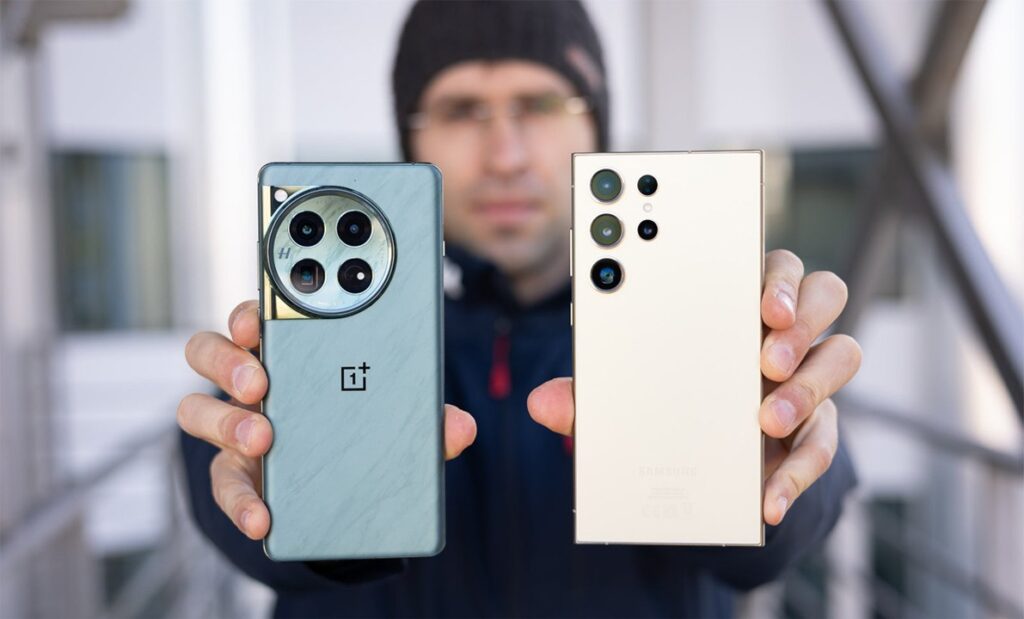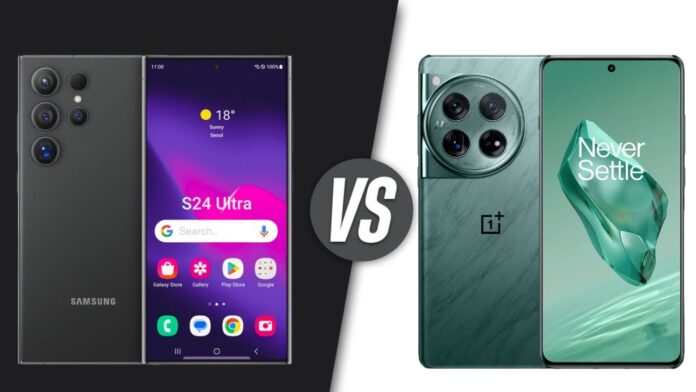The OnePlus 12 and Samsung Galaxy S24 Ultra smartphones, both released in January 2024, are currently the flagship models for their respective manufacturers. Both received high marks in our reviews due to a wide range of features, including outstanding camera setups and AI-powered technologies. But which of the two phones is better? Continue reading to learn more about the features and main differences between the OnePlus 12 and Samsung Galaxy S24 Ultra, and then decide which one is better for you.
The Samsung S24 Ultra, like the S23 Ultra before it, is one of the most powerful, user-friendly, and visually appealing phones on the market. However, it shares many similarities with the S23 Ultra. It does have some nice enhancements, such as flat screen and edge designs, increased brightness, and possibly even greater battery life, but it is far from a revolutionary update.
In contrast, the OnePlus 12 improved on last year’s OnePlus 11’s excellent design while increasing the intensity of its hardware, display, and cameras, outperforming almost every other phone on the market. One of the few manufacturers that did not succumb to the increasingly pervasive shadow of AI, OnePlus focused its efforts on creating a no-frills, industry-leading flagship, and in most ways, it succeeded.
ONEPLUS 12 VS SAMSUNG GALAXY S24 ULTRA: SPECS COMPARISON
Both phones are currently available for purchase, while Samsung has a significantly larger availability. Samsung’s phone, like the OnePlus 12, is available on Amazon and Best Buy, as well as all major US carriers.
The S24 Ultra starts at $1,300 for 12GB RAM and 256GB storage, but there are several trade-in incentives and promotions that help reduce the cost. Meanwhile, OnePlus is providing a substantial trade-in offer for customers who buy straight from their website: the deal will save you at least $100 off the retail price if you trade in any phone in any condition (even a 20-year-old broken flip phone would work).
CAMERA
Although both phones are capable of shooting decent shots, the OnePlus 12 and Galaxy S24 Ultra have different camera setups. The OnePlus 12 has three cameras: a 50MP primary, a 48MP 2x telephoto, and a 64MP 3x periscope lens. The S24 Ultra’s camera system consists of a massive 200MP main lens, a 50MP 5x periscope lens, a 12MP ultrawide, and a 10MP telephoto lens.

One of the most notable differences between the two devices is the OnePlus’s lack of AI functionality, particularly the AI-based photo editing technology. The S24 Ultra includes a variety of AI-powered photo editing capabilities that can greatly improve your photographs. The eraser removes distractions from photographs using accurate generative fill, and the Generative Edit allows you to correct a crooked image by having your phone fill in the blanks from the borders.
Although the OnePlus produces decent images, particularly during the day, with “great dynamic range and vibrant colors that make images pop” and “can even easily handle extreme backlighting,” its lack of AI-based photo editing technology causes it to fall short in comparison to the S24 Ultra.
DESIGN AND DISPLAY
Design-wise, the OnePlus 12 isn’t much different from the OnePlus 11 there won’t be many changes on the surface. OnePlus appears to have found a comfort zone that it is reluctant to leave. The OnePlus 11, OnePlus 10 Pro, and OnePlus 9 Pro all share a distinct design language, therefore the OnePlus 12 will naturally fit into that order. The characteristic ring switch from prior OnePlus devices returns, but this time on the left side of the phone, which is opposite of where it usually is.
Meanwhile, the Galaxy S24 Ultra switches to titanium, much as the iPhone 15 Pro series did a few months back. The current Samsung flagship also features a flawlessly flat display, a significant departure from prior years’ top Samsung flagships, which all featured slightly curved displays. While the Galaxy S24 Ultra display is now fully flat, the side frame is not–there’s a little ergonomic curve that makes the phone feel more comfortable in your palm, which is a great feature.
The OnePlus 12 comes in two colors: Emerald Green and Silky Black. The Galaxy S24 Ultra comes in Titanium Yellow, Titanium Violet, Titanium Black, and Titanium Gray; Titanium Orange, Titanium Green, and Titanium Blue are only available on Samsung.com. The Galaxy S24 Ultra comes with a small packaging that contains no charger. However, OnePlus deviates from current market trends and maintains its practice of delivering a fast charger in the box, significantly increasing the overall value of the OnePlus 12.

The OnePlus 12 features a huge 6.82-inch display with high QHD+ resolution and the now-standard LTPO 3.0 screen refresh technology, which allows the phone to dynamically cycle between 1 and 120Hz for the best experience. This will result in a much more gratifying scrolling experience across the UI, as well as the ability to conserve battery life in some instances.
However, the most noteworthy screen feature of the OnePlus 12 is its very high peak brightness. OnePlus stated that the phone will be able to reach over 4,500 nits of brightness, however, this is almost definitely measured with only a single white pixel of the display turned on and all available power directed towards it. In real-world scenarios, where the entire panel is continually in use, peak display brightness will be significantly lower.
Moving on, the Galaxy S24 Ultra will feature the same 6.8-inch Dynamic AMOLED display as previous Galaxy Ultra flagships. This phone’s display sports a 3080 x 1440 pixel panel with a decent 500ppi sharpness and Gorilla Glass Armor, which is both scratch-resistant and less reflective, improving legibility in broad daylight circumstances. Its brightness is likewise equivalent to the OnePlus 12 in real-world settings and according to our tests.
HOW’S THE PERFORMANCE?
Both the OnePlus 12 and S24 Ultra use Qualcomm’s Snapdragon 8 Gen 3 chipset, however, there are several key distinctions between the two.
The S24 Ultra’s chipset is a customized version of Qualcomm’s Snapdragon that was specifically created for the Galaxy. While the chipset includes capability for on-device generative AI, the OnePlus 12 lacks functionalities seen on the S24 Ultra. Powerful Galaxy AI functions, like as AI-powered transcription, translation, and the previously mentioned photo-editing technology, are simply not available on the OnePlus 12.
Both handsets run Android 14 but with different custom skins. The OnePlus boasts OxygenOS UI, which Lewis calls “one of the best around,” while the S24 Ultra sports Samsung’s OneUI overlay. According to Lewis, the OneUI skin provides a “much-needed refresh” to Samsung, including a redesigned notification shade with “a better quick settings layout and small tweaks like the ability to access the full quick settings menu with a swipe down from the right-hand corner.”
In our Benchmark tests, we discovered that the S24 Ultra outperformed the OnePlus 12 on both Geekbench single-core and multi-core, scoring 2229 and 6853 compared to 1418 and 5054.
In terms of gaming frames per second, the two were quite equally matched, with the S24 Ultra having somewhat better figures.
GET THE ONEPLUS 12 FOR:
- The lesser price.
- The display is 10-bit and supports Dolby Vision.
- Larger batteries provide longer battery life.
- Much faster charging rate.
GET THE SAMSUNG GALAXY S24 ULTRA FOR:
- The stronger construction provides superior intrusion protection.
- The S pen.
- A brighter and less reflective display.
- The speakers are louder and significantly clearer.
- The significantly faster burst performance and extended software support.
- The more versatile camera system includes a 5x telephoto.
- The Galaxy AI has several features.


